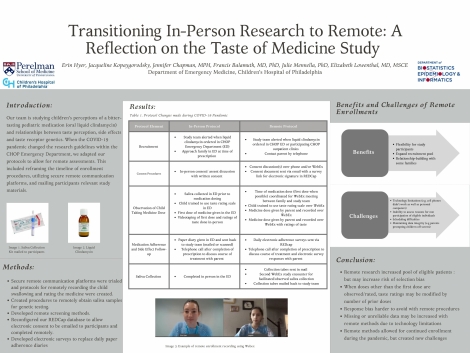Erin Hyer
Transitioning In-Person Research to Remote: A Reflection on the Taste of Medicine Study
Abstract
Background: Our team is studying children’s perceptions of a bitter-tasting pediatric medication (oral liquid clindamycin) and relationships between taste perception, side effects and taste receptor genetics. When the COVID-19 pandemic made enrollment of research participants in the CHOP Emergency Department impossible, we adapted our protocols to allow for remote assessments.
Methods: Secure remote communication platforms were trialed and protocols for recording the child swallowing and rating the medicine were created. We also created procedures to remotely obtain saliva samples for genetic testing.
Results: The Webex platform allowed participants’ faces to be viewed clearly throughout the encounter. Consent documentation was obtained through an online REDCap platform that emails links for participants to complete remotely. Saliva collection kits were mailed to participants and sample collection was conducted during a separate virtual encounter with a member of the research team. These remote methods allowed flexibility for study participants and allowed the study to expand its recruitment pool to multiple sites without the need to hire additional study staff. Challenges included scheduling difficulties, inability to assess reasons for non-participation of eligible individuals, technological limitations (e.g. families relying on cell phones which could not be easily held still through the encounter) and maintaining data integrity by limiting parental “cues” given off camera to child participants.
Conclusion: The pandemic accelerated production of remote research methods which can improve study enrollment rates but may lead to new selection biases and data reliability concerns.
Keywords
remote research, using secure platforms, Webex, electronic consent forms, oral liquid clindamycin, saliva collectionAbout Us
To understand health and disease today, we need new thinking and novel science —the kind we create when multiple disciplines work together from the ground up. That is why this department has put forward a bold vision in population-health science: a single academic home for biostatistics, epidemiology and informatics.
© 2023 Trustees of the University of Pennsylvania. All rights reserved.. | Disclaimer



